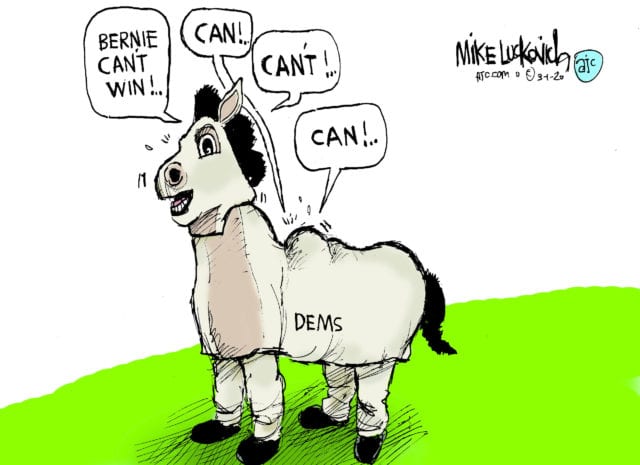Five Super Tuesday pre-takes:
- Though some urban areas are purpling up, Oklahoma’s fire-engine red political reputation remains solid – a Democrat hasn’t carried the state since LBJ in 1964.
So it might surprise you to know that more than half the state’s registered voters are eligible to vote in Super Tuesday’s Democratic presidential faceoff.
Thanks to Democrats opening their primary to independents, more than 1 million Oklahomans can weigh in on the Democratic challenger to President Trump – 738,256 Democrats and 332,111 independents.
Republican turnout is expected to be low since Trump is a prohibitive favorite for renomination. Democratic turnout, though, could serve as a barometer of sorts for anti-Trump fervor even in uber conservative Oklahoma.
- How will Super Tuesday play out for Democrats in Oklahoma? It’s difficult to handicap, given the developments of the last 72 hours or so.
Joe Biden appears to be surging post-South Carolina. Amy Klobuchar, Pete Buttigieg and Tom Steyer are out. Bernie Sanders’ loyalists are eager to deliver Oklahoma again – just like four years ago. Michael Bloomberg’s checkbook along with some key endorsements – former Gov. Brad Henry and former Tulsa Mayor Kathy Taylor – make him a contender. Elizabeth Warren is Sooner born and bred, so you can’t count her out …
If I were to bet, I’d put money on Sanders and Biden 1-2, though not necessarily in that order. And I wouldn’t be shocked if Warren sneaks past both Sanders and Biden to win the Oklahoma primary.
After all, Oklahoma voters are known to produce surprises. Remember when football legend Steve Largent was the prohibitive favorite to be elected governor in 2002? It didn’t happen. Instead, it was a little known Shawnee state Sen. Brad Henry who captured Oklahoma government’s top prize.
- Super Tuesday has proven super this year for what’s oft-dismissed nationally as a small, flyover state. Most of the candidates still in the race have parachuted into Oklahoma at least once, affording eligible voters the opportunity to size them up in person.
Even so, many yellow dog Democrats are as conflicted as I’ve ever seen them when it comes to settling on a candidate. From my conversations, the decision appears to come down to this: Do you vote your aspirations? Or is electability the No. 1 issue?
Super Tuesday will answer the question: heart or head?
- Just for fun, let’s break down Oklahoma’s version of Super Tuesday by the numbers:
14 – Democratic candidates appearing on the presidential primary ballot.
5 – Democratic candidates still actually competing for the nomination.
42 – Oklahoma delegates to the Democratic National Convention in Milwaukee July 13-16. Thirty-seven will be pledged delegates and five will be super-delegates.
7 – Oklahoma counties that will decide whether to permit liquor stores to open on Sundays: Oklahoma, Tulsa, Cleveland, Creek, Kingfisher, Muskogee and Washington.
Background: The local option vote is in response to 2016’s approval of SQ 792, permitting groceries and convenience stores to sell wine and strong beer for the first time. Traditional package stores have been at a competitive disadvantage ever since, required – unlike groceries and convenience stores – to be closed on Sundays.
- If you were among the thousands who voted early or by absentee, chances are you might have checked Pete Buttigieg or Amy Klobuchar on your ballot. Both dropped out on the eve of Super Tuesday, meaning votes for them will at best be a footnote in Oklahoma political history.
It’s times like this that I’m reminded of the wisdom of ranked choice voting – the system where voters rank their choices by preference.
How does it work? Voters rank candidates on the ballot – first choice, second, third and so on. If no candidate receives more than 50% of the initial vote, the candidate with the fewest “first” votes is eliminated and their voters’ second choices are added to their No. 2 candidates’ totals. This process continues until a candidate secures 50%-plus-one.
Eight states already use ranked choice voting in either state, federal or local elections – New Mexico, Colorado, California, Minnesota, Massachusetts, Maryland, Maine and Michigan. It’s legal in four more – Oregon, Florida, New York and Tennessee – though it hasn’t been used yet. And six states – Louisiana, Arkansas, Mississippi, Alabama, South Carolina and Illinois – already use it for military and overseas voting.
Not only would ranked choice voting save state and local governments money by reducing the number of elections, it also likely would force candidates to appeal more broadly to voters. If you’re not someone’s first choice, you surely want to be their second, just in case.
In the Super Tuesday scenario – where Klobuchar, Buttigieg, Cory Booker, Deval Patrick, Marianne Williamson, Tom Steyer, Michael Bennet, Julian Castro and Andrew Yang all dropped out after Oklahoma’s ballots were printed – wouldn’t it have been nice to be able to rank your preferences – and for your voice to be heard?
Polls are open Tuesday from 7 a.m. to 7 p.m.








